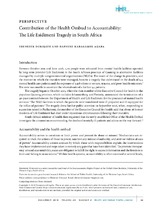Contribution of the health Ombud to accountability: The life Esidimeni tragedy in South Africa
Abstract
Between October 2015 and June 2016, 1,711 people were relocated from mental health facilities operated by long-term provider Life Esidimeni in the South African province of Gauteng to alternative facilities managed by multiple nongovernmental organizations (NGOs). The result of the change in providers, and the manner in which the transfers were managed, became a tragedy that culminated in the death of 144 mental health care patients and the exposure of 1,418 others to torture, trauma, and poor health outcomes. The state was unable to ascertain the whereabouts of a further 44 patients. The tragedy began in October 2015, when the then member of the Executive Council for health in the populous Gauteng province, which includes Johannesburg and Pretoria, announced the termination of a 40-year contract between the Department of Health and Life Esidimeni for the provision of mental health services. The NGO facilities to which the patients were transferred were ill prepared and ill equipped for the influx of patients. The tragedy drew further public attention in September 2016, when, responding to a question raised in Parliament, the member of the Executive Council for health said that about 36 former residents of Life Esidimeni had died under mysterious circumstances following their transfers. South Africa’s minister of health then requested that the newly established Office of the Health Ombud investigate the circumstances surrounding the deaths of mentally ill patients and advise on the way forward.

